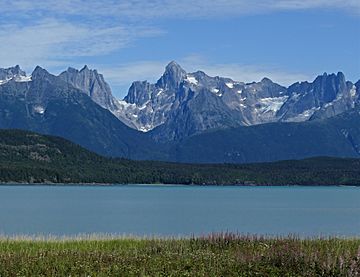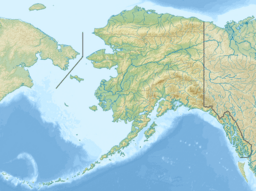Sinclair Mountain facts for kids
Quick facts for kids Sinclair Mountain |
|
|---|---|

Sinclair Mountain, west aspect
|
|
| Highest point | |
| Elevation | 6,800+ ft (2,070+ m) |
| Prominence | 3,600 ft (1,100 m) |
| Isolation | 10.95 mi (17.62 km) |
| Geography | |
| Location | Tongass National Forest Haines Borough Alaska, United States |
| Parent range | Coast Mountains Boundary Ranges |
| Topo map | USGS Skagway A-1 |
| Type of rock | granite |
| Climbing | |
| First ascent | 1973 |
| Easiest route | class 5.4 |
Sinclair Mountain is a tall mountain peak in Alaska, a state in the United States. It stands 6,800+ ft (2,070+ m) high. This mountain is part of the Boundary Ranges, which are a section of the larger Coast Mountains.
You can find Sinclair Mountain about 26 mi (42 km) south of a town called Skagway. It's also 15 mi (24 km) north of Lions Head Mountain. The land around Sinclair Mountain is managed by the Tongass National Forest, a huge protected area. Even though it's not the highest mountain, it rises very steeply. It goes up 6,800 feet from the water of Chilkoot Inlet in just about 3.5 mi (6 km). This makes it look very impressive!
The mountain got its name in 1920. It was named by the U.S. National Geodetic Survey to honor Cephas Hempstone Sinclair. He was an engineer who worked for that agency for 47 years, studying water and land. The name was officially approved in 1920 by the United States Board on Geographic Names. The first time anyone climbed this mountain was in June 1973. The climbers were Jerry Buckley, Joe Greenough, and Craig Lingle.
Contents
What is the Weather Like on Sinclair Mountain?
Sinclair Mountain has a type of weather called a subarctic climate. This means it has very cold winters with lots of snow. The summers are cool, not hot.
How Does Weather Affect the Mountain?
Weather systems from the Gulf of Alaska hit the Coast Mountains. The mountains force the air upwards, which causes a lot of rain and snow to fall. This is called orographic lift. Temperatures on the mountain can drop below −20 °C (which is −4 °F). With the wind, it can feel even colder, below −30 °C (−22 °F).
Are There Glaciers on Sinclair Mountain?
Yes, because of the cold climate, there are glaciers on the north, south, and east sides of Sinclair Mountain. These are large, slow-moving rivers of ice.
When is the Best Time to Visit?
If you want to see or climb Sinclair Mountain, the best months are May, June, and July. The weather is usually most pleasant during this time.
Images for kids
 | Calvin Brent |
 | Walter T. Bailey |
 | Martha Cassell Thompson |
 | Alberta Jeannette Cassell |



